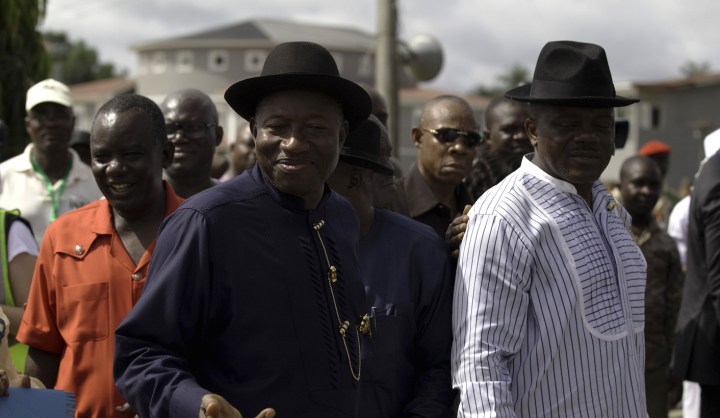Africa
Nigeria decides: So far, so good

Nigerians have voted in what commentators are describing as Africa’s most important election. There have been problems - even President Goodluck Jonathan failed to vote on his first attempt - but this shouldn’t take away from what has been an impressive process so far. There are grounds for cautious optimism, although the real test comes later, when the results are announced. By SIMON ALLISON.
Nigeria has voted. In elections that ran on to a second day in some areas, citizens cast their ballot in what is undoubtedly the tightest presidential contest in the country’s history. Current president Goodluck Jonathan may have all the benefits of incumbency, but he’s running neck and neck with challenger Muhammadu Buhari whose opposition coalition is putting in a strong showing.
Although it’s early days yet, we can make a few encouraging observations.
First, the vote happened. This was by no means guaranteed. It was meant to happen six weeks ago, but was postponed on security grounds. At the time, many thought that this was a grievous blow to Nigeria’s democracy, and wondered if the election would take place at all. Meanwhile, the cause of the security crisis – Islamist militant group Boko Haram – was promising to do everything in its power to prevent this democratic exercise, which runs counter to their strict, conservative ideology. “This election will not be held even if we are dead. Even if we are not alive, Allah will not allow you to do it,” said Boko Haram leader Abubakar Shekau in a video released in February. This prediction, mercifully, was wrong.
Second, the vote was relatively peaceful. This too was far from certain. Between Boko Haram’s threats, and the high tensions between the two major political parties, the prospect of violence was real. And, it must be emphasised, there was violence. A total of 23 people were decapitated by Boko Haram attackers in a village in Borno State, the village burned to the ground. At least another 14, including an opposition politician, were killed in three other Boko Haram raids on polling stations in the north-east of the country. But while devastating, Boko Haram have been carrying out these kinds of attacks for several years; this kind of death toll is well within the range of what has, tragically, become normal in Nigeria. Despite Boko Haram’s threats, the elections did not precipitate a surge in violence, and so far political parties have behaved themselves. To put this in comparison: after the last election, some 800 people lost their lives in post-election rioting. Mercifully, Nigeria is still well off that number.
Third, the turnout was good. Although we’re still waiting for official figures, a government spokesman said it was a “record high voter turnout”, a sentiment echoed by the opposition All Progressives Congress. For all those people who were worried about the state of Nigeria’s democracy, this is a most effective riposte: millions have braved serious threats of violence to exercise their democratic rights. How many western voters would do the same?
Results will take several days to compile, although some have already trickled in. The early numbers look good for the APC, although it’s such a small sample that it would be dangerous to infer anything about the bigger picture. Nonetheless, party members would have enjoyed their victory in the Aso Rock ward, which is where the presidency is located. Most voters there are presidential staff and their families. The APC would also have enjoyed their win in former president Olusegun Obasanjo’s ward, following the high-profile falling out between Obasanjo and Jonathan; and the 100% margin for Buhari in his ward.
It’s still early days, however, and Nigeria – despite the positive start – still has several hurdles to surmount.
If neither Jonathan nor Buhari gets more than 50% of the vote, the country will have to have one or possibly even two run-off elections. These are always contentious. In fact, whatever the outcome of this vote, the announcement of the result is likely to inflame tensions. There’s a good chance that whoever loses will cry foul, and there have been a number of reports already about irregular practices (although, so far, these seem to be too insignificant to affect the final outcome).
If Buhari wins, then Jonathan has to be persuaded to leave office peacefully and in good time. If Jonathan wins, then Buhari and his supporters will have to accept the result. There’s a reason that violence associated with elections is usually ‘post-election violence’; it’s only after the vote that those who have lost out seek to redress the situation.
Nigeria, in other words, is not out of the woods yet. But it’s a good start. DM
Main Pic: Nigeria’s President Goodluck Jonathan reacts as his permanent voter’s card failed to register during accreditation in his ward in Otuoke, Bayelsa State. (REUTERS/Afolabi Sotund

















 Become an Insider
Become an Insider